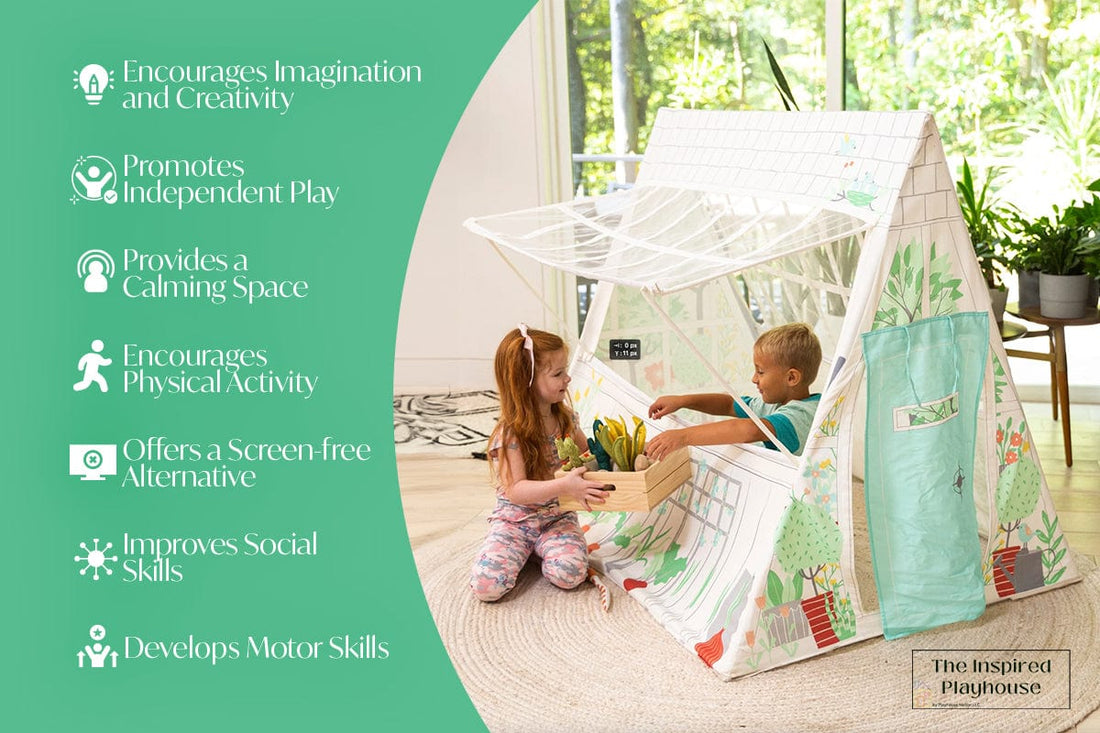Kids play tents are great for creating a fantastic atmosphere in both indoor and outdoor spaces. You may develop your children's imagination and offer them a distinct spot to call their own by building play zones for them. It might be difficult to set up a play area, though, particularly for new parents.
This post will demonstrate how to use tents to make a mystical play area. You will also learn the benefits of these tents to your child.
Benefits of a Kids Play Tent

Play tents offer many benefits that contribute to your child’s development. Here are some of the benefits a play tent can give.
Encourages Imagination and Creativity
Play tents are fantastic for developing creativity and imagination. Children have endless options with play tents. A child can become an adventurer exploring a foreign location, a chef running a busy kitchen, or a superhero saving the day in the tent. Cognitive development requires imaginative play to help your kids:
- Think creatively
- Solve problems
- Understand their surroundings
Promotes Independent Play
Kids can play in a private space with a play tent. For a youngster to have autonomy and self-worth, this is crucial. Kids get self-entertainment, decision-making, and self-following skills in a play tent.
Solo play lets kids explore their interests at their own speed, increasing self-reliance. Playing in a tent lets kids learn and explore without pressure.
Provides a Calming Space
A play tent can be a space for play and creativity as well as a quiet place to relax. In noisy or overwhelming neighborhoods, tents can give your kids a sense of security and solitude. If they need a break from sensory stimulation, having a place to relax helps kids manage their emotions.
Encourages Physical Activity
Play tents may seem fixed, but they actually inspire a lot of physical activity. Building and playing in a tent help develop their body strength because it requires:
- Crawling
- Crouching
- Reaching
- Climbing
Toddlers and young children need these actions to also gain coordination and balance. Play tents also promote active play, such as pretending to go on adventures, camping out, or putting up barriers around the tent.
Offers a Screen-free Alternative
Screen-free activities that interest kids can be hard to find today. Children can engage in creative and active play without being influenced by electronics in a play tent.
Your children need screen-free play to interact with their environment and use their imagination. You can reduce screen usage and encourage more different and interesting activities by providing a non-digital play area.
Improves Social Skills
Besides solo play, a play tent is wonderful for socializing. Playing in a tent with friends or siblings teaches sharing, collaboration, and communication.
Tents also inspire role-playing, as kids play different characters and settings. This activity helps kids learn empathy and perspective in a fun, controlled environment.
Develops Motor Skills
Tent play improves fine and gross motor skills. Crawling through the entrance, tying knots, and handling tent accessories need coordination and dexterity, which are important for growth.
Younger children improve their hand-eye coordination and precision by building up and playing in a tent. This play builds muscle and body control, preparing them for more complicated physical tasks.
How to Create a Magical Play Spaces with Tents
A well-designed tent area can be your child's haven for creative play and learning. Here are some tips to help you transform a simple tent into a magical play area that your child will love.
Choose the Perfect Tent
A magical play place starts with the perfect tent. When choosing a tent, consider size, material, and design. The tent should fit inside the play area while still being big enough for your child to play in. For ventilation, the cloth needs to be breathable, strong, and simple to clean.
Choose a tent that matches your child's interests. Be it a princess castle, pirate ship, or teepee, the tent's motif can establish the tone for the play space. A tent your child likes will make the space more appealing and encourage more time inside.
Set the Scene
Setting the scene around the perfect tent is next. The atmosphere you create will improve the experience for your child. Choose a peaceful, distraction-free space in a corner or a cozy living room. Create a clean, clutter-free play area surrounding the tent.
Next, think about the lights. Soft, warm lights can make the play place enchanting. String lights around the tent or a little bulb inside can make it cozier. You can also add charm to the space by lining the tent entrance with fairy lights.
Comfortable and pleasant tents can be decorated with rugs or pillows. These offer aesthetic appeal and cushion your child's play space.
Personalize and Decorate
Making the tent feel unique requires personalization. Encourage your child to help decorate and add their own touch. You can adorn the tent with banners, ornaments, or homemade crafts. Your child's favorite stuffed animals, cushions, and blankets can make the tent feel like their place of safety.
Your child's interests can inspire themed decorating. If they like the ocean, add seashells, fish-shaped couches, and blue lights to create an underwater atmosphere. Adding personal touches makes the place more magical and gives your child control over their play area.
Create a Reading Nook
A tent can be a pleasant reading corner, encouraging a love of books. Place a small bookshelf or basket of your child's favorite books inside or near the tent. Create a cozy seating area with bean bags or plush pillows.
Add a soft blanket to the reading nook to make it more inviting. Your child can relax and enjoy stories in the tent with you, encouraging a love of reading and quiet time.
Plan Theme Days
Fun theme days can enhance the play tent experience. You could have a "camping day" in the tent with fake campfires, marshmallow roasting, and sleeping bags. Another option is "space exploration day," where the tent becomes a spaceship and your child explores space.
These days can teach new concepts in a fun and engaging way. On a "jungle explorer" day, you may teach your child about jungle creatures and plants. These themes make playtime more regulated, enriching, and magical.
Plan Nighttime Activities
Sleepovers and quiet evening activities are excellent in a tent. With a portable projector or tablet playing your child's favorite movie, you could arrange a "movie night" in the tent. Bring popcorn and blankets for the perfect little theater experience.
Stargazing or tent storytelling at night is another option. This is also a great family bonding activity. These nighttime activities can make the tent a beautiful location for your child to relax before sleeping.
Adapt As You Go
Finally, change the play environment as your child's interests and needs shift. What excites a toddler may not interest an older child. Theme, decorations, and content updates can keep the tent engaging.
You might replace cuddly toys and basic games with puzzles, painting supplies, or complex toys as your child matures. Adapting the play environment keeps it fun and educational throughout your child's development.
Get a Play Tent Today
Play tents are a great investment for your children because they promote both physical and mental development. A memorable playtime can be created by selecting the ideal kids play tent and designing an area around it with a theme.
So, check out this play tent and start making that perfect play space for your child to grow and explore.

